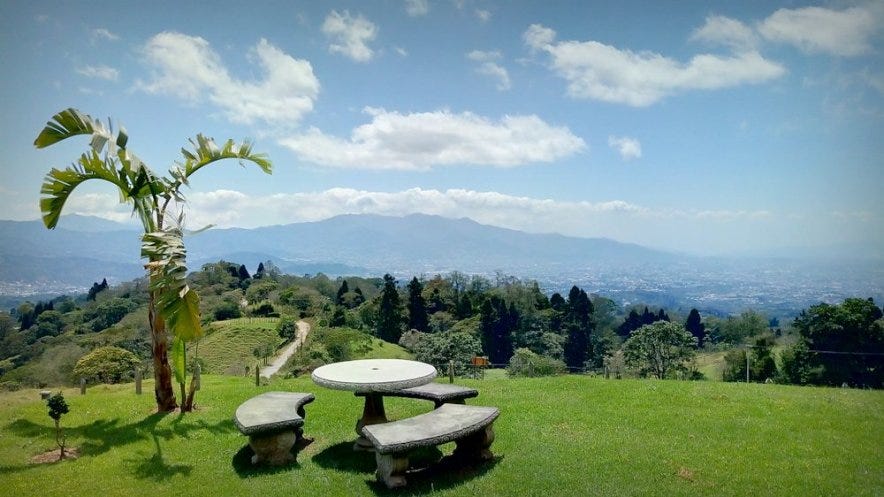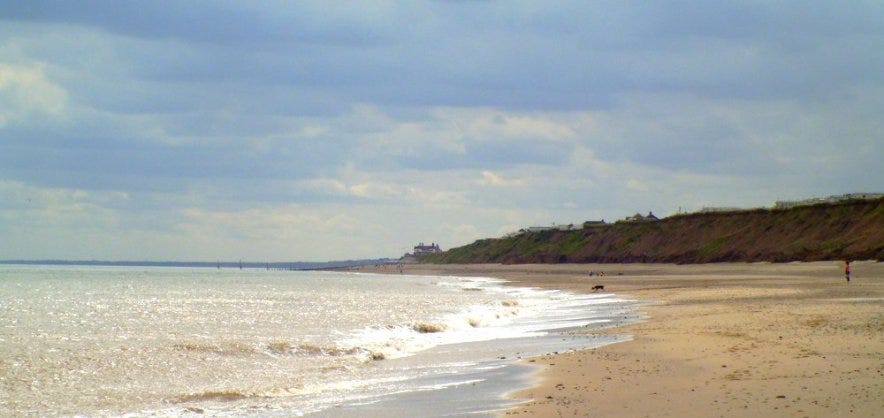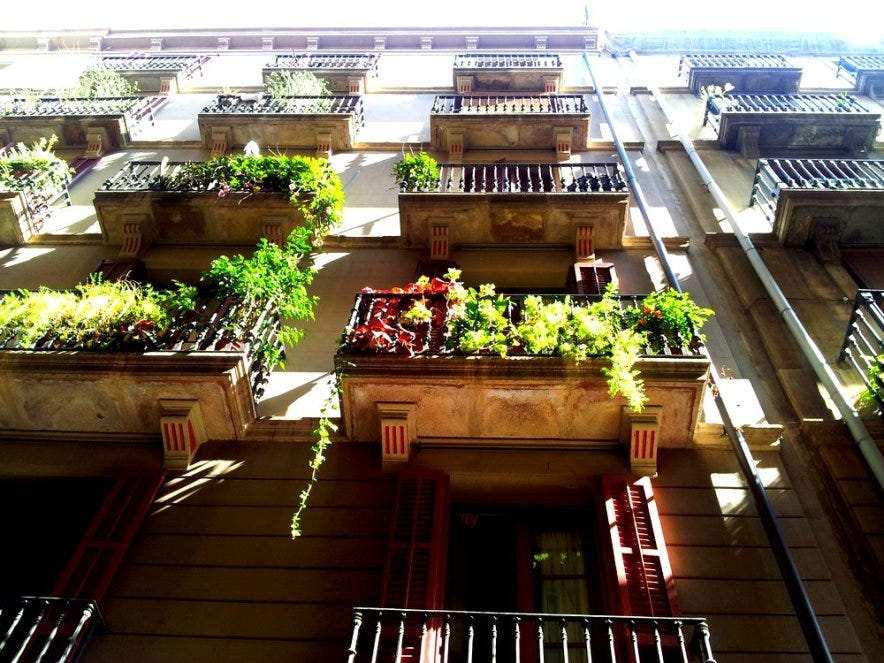Our Nothing-Lands 1: The Long Con Of The Great Indoors
Nothing wakes you up like sleeping in a sack in the rain.
Hello! This is Everything Is Amazing, a newsletter about curiosity, science, wonder, and about how if you stare at yourself too hard you can turn into a lion, because I feel like that’s probably a thing we should all be aware of.
Today, we’re returning to the season-long topic of islands! But we’re doing it in a rather odd and hopefully conceptually chewy sort of way.
Yes, the biggest islands on our planet - which we sometimes but not always call continents - get most of the attention, by way of their sheer physical presence. And yes, we love tiny, super-inhospitable flecks of land like Rockall for the delicious shiver of imagined horror they can send down the spine.
There’s plenty more to say about what everyone would easily recognise as “islands,” and I’ll be saying as much as I can before season’s end. But today, I’m going to take things in an unexpected direction. Or at least, it’s unexpected to me - it’s something I first thought about as a travel writer, and it keeps creeping back into my thinking…
It’s about the islands we invisibly, unthinkingly build into the urban environments around us, and it’s a two parter, with the second part coming in a few days…
And it starts with me, lying on the floor of a concrete shed halfway up a volcano in Costa Rica, waiting to be attacked.
Oh dear.
Well, it started out pleasantly enough. This place belongs to my partner’s father, built on an isolated patch of family land, and it’s a gorgeous spot to watch the sun go down, with a mind-blowing view of the Central Valley region.
What I initially suggested was sleeping outdoors, the way I’d been doing in Britain in my trusty AlpKit bivvy bag. But no no no, you can’t sleep outside, I’m told. Too dangerous. Bad people maybe.
Fair enough. And I really should be respectful of everyone’s wishes if they are actually from these parts, right? They’d know how risky it is. Don’t die up there, my partner advised as I packed my rucksack, and I intend to honour her request (partly for selfish reasons, I confess).
So when it’s time to sleep, I draw the shutters on the meshed, barred windows, and swing closed the steel door that wouldn’t look out of place on a submarine – and that’s when things get scary.
Every ten minutes or so I’ve almost nodded off – but then a tiny sound from outside wakes me. The crunch of leaves. The splash of water. The grating sound of a rusty machete’s cutting edge being sharpened to lethality. Low, evil laughter. Stuff like that, or pretty close. I’m almost certain that’s what it was. Yes.
Every time the noise of the outside intrudes, it makes me remember how utterly alone I am in here.
My true awareness of Costa Rica as a relaxed, friendly paradise of lovely people with a remarkable record on sustainable energy is fading away and being replaced with something fear-based, primal, largely unfair, and probably more than a touch narrow-minded.
Oh god – only 780 miles* to the east is where Narcos was set! And we’re basically in the Caribbean here!
(I’ve made the mistake of very recently watching the final season of Black Sails, and now the silence outside sounds like a lot of pirates trying to be really, really quiet.)
It’s a gorgeous night – but I’m in here, wishing I was lying on a beach in England, getting rained on. You know where you are with English rain. If it’s going to kill you, it’ll probably take months and involve consumption, laudanum and a week in an iron lung. But this place? I could be a goner before I put my spectacles back on.
Round and round I go with all this. I nod off – then there’s a noise outside – then I lay there quivering with fear in the dark. This cycle repeats itself maybe a dozen times.
Somewhere around 2AM, a kind of reckless madness takes over. I wriggle out of my sleeping bag, drag my trousers back on and yell through the wall:
“RIGHT YOU BASTARDS, I’M COMING OUT. THIS IS YOUR CHANCE TO DO YOUR WORST. BUT I’M NOT GOING TO MAKE IT EASY FOR YOU!”
I throw the door open with a bang.
Outside, San Jose shimmers and glitters – a vast carpet of streetlights that begins a few miles away and spreads to the deeper-dark line of volcanoes and mountains on the horizon.
It’s breathtaking. My breath is utterly taken.
I stand there for a few minutes, waiting for death – but it doesn’t come, and my feet start getting cold, so I go inside and put the kettle on.
Then I come back out with my sleeping bag, climb into it, lean back against one of the shed’s outer walls and drink my tea, watching the rippling lights. It’s like watching the sea: always-changing, always the same.
I feel part of the world again.
The night may be dark and occasionally filled with terrors, but it’s also filled with beauty, with fireflies and other nocturnal life too timid and human-averse to show its face during daylight, with this mesmerising web of streetlights mapping out the daily lives of 340,000 strangers … and, far above the orange glow of the city, with a sky of constellations of stars, hanging at all the wrong angles for my English brain to comprehend.
I finish my tea and wriggle-hop back inside, closing the door behind me- but this time, I open the shutters wide, letting the night air in through the bars, so I can see and hear everything.
I fall asleep in minutes.
It’s a weird thing, this idea of the “Inside” we’ve created.
I’ve mentioned this before to paid subscribers when talking about technofossils and plastiglomerates, but not to the rest of you, so let’s unpack this faintly ludicrous statement a bit.
Glance up from wherever you’re reading this, and look around you. Are you inside or outside? I bet you can answer that without thinking.
Now – look at the nearest place where one turns into the other. A doorframe, for example, or a window. What exactly happens there? What subtle magic does it weave upon your existence?
We have many “insides”, like when you’re inside a sleeping bag. But there’s also that general overarching Inside where most of us (the most fortunate of us) make a comfortable home for ourselves – and it’s almost always the opposite of the outdoors.
Go back just a few centuries and you’d find many somewhat-polite societies that were terrified of the outdoors. Take the English countryside, which for hundred of years was a place where all the carefully-made rules of society fell apart and the absolute worst was possible. A place of vagrants, lunatics, death and despair. It was where Nature could tear you to pieces – and it’d be entirely your own damn fault for being foolish enough to go there in the first place.
(Not for nothing did Thomas Hardy make lonely rural corners of southern England the backdrop for many a foul and mysterious deed in his novels - for example, the fictional Egdon Heath from The Return Of The Native: “Civilization was its enemy…the great inviolate place had an ancient permanence which the sea cannot claim.”)
So, you retreated Inside, to where everything was controllable, predictable and safe.
And of course that’s where a whole bunch of modern problems started.
There’s the polluted air in our homes, our places of work and even our classrooms. There’s the lack of a distant horizon to lift your spirits and make you feel like everything’s possible. There’s the lack of Vitamin D from sunlight. There are the ailments and biological malfunctions associated with overextended indoors activities (like sitting). On and on the list damningly goes.
So when National Geographic says “This is your brain on Nature“, I suppose what it’s really saying is “This is your brain when you’re not Inside.”
So, the solution’s obvious, isn’t it? This is just about getting outdoors more often, like Scottish GPs are prescribing right now? And if you’re sleeping badly, you just sleep outside every once in a while, right?
Not so fast.
That’s the quick-fix version – but it’s like the most commonly-lauded solution to our modern problems with tech, nicknamed the digital detox, the kind tech journalist Paul Miller undertook, as I wrote about here.
Venkatesh Rao calls this “Waldenponding”, an example of something presented as an idealised and radical intervention with a demonized issue – and the benefits of a more balanced and practical approach are completely ignored, along with any worrisome consequences a polarised approach brings. (Specifically in this case: “retreating from information flows is just a different way of having your attention hacked by others.”)
The solution isn’t to say the Outside is always great and our wholly artificial islands of the Inside are always terrible. That’s just more separating. It’s just creating more There as opposed to expanding our idea of Here.
Instead, maybe we could find ways to smudge or even erase this artificial line that creates “Here” and “There”, before it does even more damage to our sense of being in the world, being truly aware of it and feeling part of it enough to invite it “in”?
(Yes, the language remains tricky here.)
It’s late autumn in 2013, and I’m laying on the beach just south of Bridlington, East Yorkshire, waiting to stop getting rained on.
Well, this is certainly an appalling hobby I’ve chosen for myself. Great job. What the hell is wrong with me? Who can I blame for this? Alastair Humphreys? No, it’s my fault. I should be doing this halfway up a mountain somewhere warm, say, I dunno, Costa Rica? God, you’re so stupid, Mike.
In one sense I’m OK, because I’m inside my bivvy bag, and I’m discovering it’s marvellously waterproof. (Terrific things, bivvy bags. Don’t get me started.)
But in every other sense, I’m laying in a sack in the open (like an idiot, Mike), alone on the beach during a rainstorm, because everybody with even a scrap of good sense is indoors right now. There’s no hiding this fact. I open my eyes and there it all is, just beyond the dripping drawstring hood of my Hunka. It’s all so awful.
But then suddenly, it isn’t. It’s just a bit weird.
And around 3am, two surprisingly dry hours into the storm, it’s become a delicious mixture of exciting and hilarious. If I was looking for an opportunity to laugh at myself, this is certainly it.
And there’s the thrill of the roaring sea and the hissing rain and the lights of Bridlington being just there. I can see everything – including anyone approaching. Against my training as a modern human being, I feel perfectly safe. (Obviously, everyone’s mileage may vary. But that’s how I felt at the time.)
And then I fall asleep, in a way I’ll one day struggle to do in a concrete shed half the world away.
A lot of our love of the Inside is about nervousness, a need for security and of avoiding the chaos of the not-ours, or just plain fear. Fear of what strangers are capable of. Fear of the unknown. Fear of what can’t be controlled, and of what we don’t own.
Travel is all about confronting those fears head-on. As Gary Arndt says on Tim Ferriss’s blog:
“Many people are afraid of the world beyond their door, yet the vast majority of humans are not thieves, murderers or rapists. They are people just like you and me who are trying to get by, to help their families and go about living their lives. There is no race, religion or nationality that is exempt from this rule. How they go about living their lives might be different, but their general goals are the same.”
I’ve always believed this, and as much as I’m aware I operate under all the privileges that being a not-entirely-penniless white Englishman with a deeply unthreatening blank expression of a face can bestow, acting upon that belief has not (yet) got me into trouble.
What if the same is true with our sense of what’s inside and outside? What if we didn’t feel quite as threatened by what’s ‘out there’ - or at least prodded at that dangerous-feeling uncertainty a little?
What if that boundary became more porous to our curiosity about what’s really there, enough for us to actually go find out, instead of assuming the worst?
What if you can hide away in privacy any time you want – but you never have to feel alone?
Take your home. Who are your neighbours within a couple of hundred yards in every direction? How are they living their lives?
If you don’t know, why not find out, under the pretence of, say, having baked too much fruit cake and hello, erm, I was/we were thinking would you like some and I can’t believe this is the first time we’ve said hello considering we only live just across the way, oh isn’t that so odd, good grief?….
Maybe one way to tackle this is hanging out in places that feel less Indoors-y. Wooden sheds are ideal (concrete a little less so, unless you leave the window open). Tents in fields are pretty good. Bivvy bags on hillsides are magnificently alarming. And so on.
Get creative. Explore the edges. Sweat just a little.
However you do it, find out what it does to you when you’re somewhere that’s neither In nor Out – or just incredibly, phenomenally Out, but with that sense of security and comfort you’d normally associate with being indoors, except with an added thrill of raw connection with everything around you that feels well worth exploring…
Or you could just fall asleep. I wouldn’t blame you for that in the slightest. Job well done.
But one really fun effect of sleeping outdoors is that you start automatically looking for places to sleep outdoors.
This is a little like the after-effects of spending 6 weeks trowelling things in the ground when I was an archaeologist - you start to mentally trowel everything in front of you as you walk along. Oooh, blimey, that’s a big stone. I’ll need a mattock to lever that one up, but first I’ll need to scrape away enough of that corner to get a hold. Wait, what am I even saying? Keep walking, you fool.
But in this case, you’re constantly assessing a place’s suitability for an overnight sleeping spot, even when you already have plans for the night. Too close to the path? You’re likely to be stumbled over by an early morning dog-walker. Within sight of the road? Too exposed, too unsafe, and it’d be embarrassing when someone spots you. (Worst case scenario: they ring the police and report you’re a “body”.) Chance of rain? Highly likely in the UK at all times. Chance of being savaged by dangerous wild animals? Essentially zero in the UK. Chance of being bitten? Yikes. And so on.
But most of all, you become intensely aware of all the patches of land that surround us that we hardly ever pay attention to, all the unloved-looking grassy or concrete expanses of seeming-nothingness - and you’ll think to yourself, that’s a shame. What a depressing waste of space that is.
So hey, what could we do about that?
Next time: Reclaiming Our Nothing-Lands
*That’s the distance from London to Madrid, Mike. What an idiot you are.
Further Reading:
– “The Nature Fix: Why Nature Makes Us Happier, Healthier And More Creative” – Florence Williams
- “Home Is A Cup Of Tea” - Candace Rose Rardon
Images: Mike Sowden











Great article, and yes, I imagine the UK is ultimately safe to be outside. Here in the Great Basin of Nevada, there's a lot of wild desert out there and ... bodies long lost and moldering in juniper duff. When I first moved here, I walked in the desert just a block from my house. At first, it was exhilarating. Then I started noticing people, mostly men, hanging around. They'd watch me as if I was threatening their score ... of what who knows. Outdoor places are lovely. I retreat from my nightmares by walking outside to my garden where I gaze at the Universe until the dreamscapes soften. It's a fenced garden, though, the proverbial paradiso ... the walled garden of ancient cities formed in the virgin desert. I love it, but because a people who believe the wilderness is theirs to do what they want, I am less afraid of meeting a bear or cougar on the trail than a man. Alas.
Sorry for another comment! But I kept thinking about your last line, so I had to comment one more time!
"Hell is nothing but yourself, alone against the world"
These are such powerful words...don't really know how to approach this...they're just a few words, but they encompass so much...